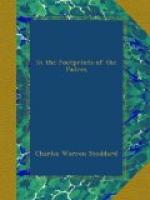How are the mighty fallen! The Hill, of course, had the farthest to fall. South Parkites merely moved out: they went to another and a better place. There was a decline in respectability and the rent-roll, and no one thinks of South Park now,—at least no one speaks of it above a whisper. As for the Hill, the Hillites hung on through everything; the waves of commerce washed all about it and began gnawing at its base; a deep gully was cut through it, and there a great tide of traffic ebbed and flowed all day. At night it was dangerous to pass that way without a revolver in one’s hand; for that city is not a city in the barbarous South Seas, whither preachers of the Gospel of peace are sent; but is a civilized city and proportionately unsafe.
A cross-street was lowered a little, and it leaped the chasm in an agony of wood and iron, the most unlovely object in a city that is made up of all unloveliness. The gutting of this Hill cost the city the fortunes of several contractors, and it ruined the Hill forever. There is nothing left to be done now but to cast it into the midst of the sea. I had sported on the green with the goats of goatland ere ever the stately mansion had been dreamed of; and it was my fate to set up my tabernacle one day in the ruins of a house that even then stood upon the order of its going,—it did go impulsively down into that “most unkindest cut,” the Second Street chasm. Even the place that once knew it has followed after.
The ruin I lived in had been a banker’s Gothic home. When Rincon Hill was spoiled by bloodless speculators, he abandoned it and took up his abode in another city. A tenant was left to mourn there. Every summer the wild winds shook that forlorn ruin to its foundations. Every winter the rains beat upon it and drove through and through it, and undermined it, and made a mush of the rock and soil about it; and later portions of that real estate deposited themselves, pudding-fashion, in the yawning abyss below.
I sat within, patiently awaiting the day of doom; for well I knew that my hour must come. I could not remain suspended in midair for any length of time: the fall of the house at the northwest corner of Harrison and Second Streets must mark my fall. While I was biding my time, there came to me a lean, lithe stranger. I knew him for a poet by his unshorn locks and his luminous eyes, the pallor of his face and his exquisitely sensitive hands. As he looked about my eyrie with aesthetic glance, almost his first words were: “What a background for a novel!” He seemed to relish it all—the impending crag that might topple any day or hour; the modest side door that had become my front door because the rest of the building was gone; the ivy-roofed, geranium-walled conservatory wherein I slept like a Babe in the Wood, but in densest solitude and with never a robin to cover me.




